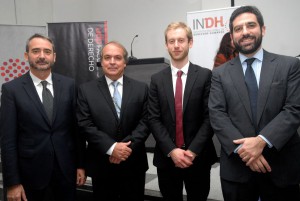I have just returned from an express trip to Chile at the invitation of the Chilean Institute of Human Rights (INDH) and the Human Rights Programme at Diego Portales University (UDP) to join them on 12 May for an international conference on the Strengths and Limitations of Human Rights Institutionalization. We were joined by José Miguel Vivanco, Director of Human Rights Watch Americas, Amerigo Incalcaterra, regional OHCHR representative for the Americas, and many colleagues, observers and practitioners from the human rights community in Chile.

I was also able to join Tomas Vial, the Director of the Human Rights Programme at UDP, colleagues from the university and INDH for a small research seminar on a project I am currently developing on the effectiveness of NHRIs with Katerina Linos. This project includes the Chilean INDH as a key case study, so this was fantastic opportunity to subject our arguments to the ultimate test: does it make sense to the practitioners?
The following day I joined a panel to share comparative insights on human rights institutionalization at the international conference organised by the INDH and UDP. I was tasked with presenting the European perspective, drawing on the experience of NHRIs in the region (presentation available here in English and Español). A collection of presentations will be published by the INDH.
Chile presents a quite distinct human rights setting to many other countries in the region, displaying a relatively strong attachment to democratic practices (before and after 1973-1989) and rights guarantees. There is clearly a lot to be gained from within and cross-regional analysis, as highlighted also in a path breaking research project led by colleagues at UCL Institute of the Americas on the inter-American human rights system.
Perhaps more than elsewhere in the region, Chile presents an institutional density not dissimilar to that found in many European jurisdictions. The country is currently in the middle of an ambitious programme of human rights institutional reform. Decisions taken this year will have important legacy effects for the performance of human rights structures in the country for years to come.
At the same time, the current and founding Director of the INDH, Lorena Fries, will depart from the institution this July, along with five members of the Council. The credibility of the INDH under Fries leadership has been hard won, in the face of significant opposition from powerful political factions (see here an interview with Fries in December 2012). The future autonomy of the INDH is now in the hands of the Chilean congress. Whether Congress can achieve the political consensus required to appoint a credible successor to Fries will be a key test for human rights institutionalization in Chile.
